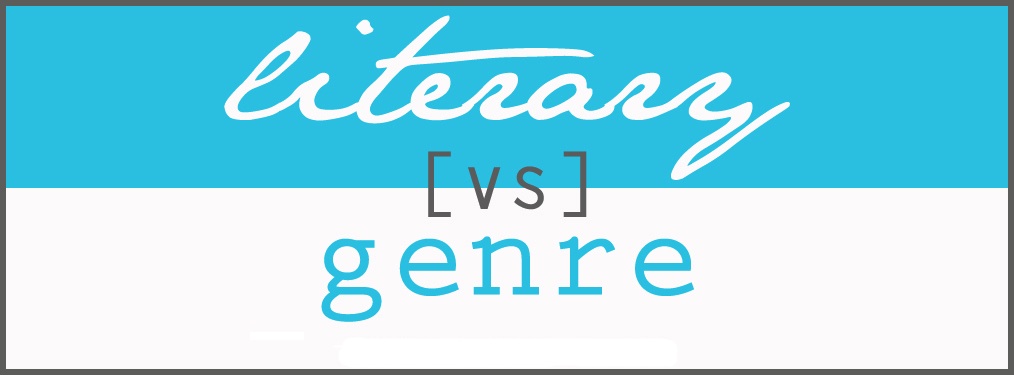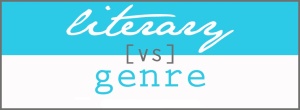
Literary vs. Genre: Do I Have to Choose?
 So, just how wide is the gap between Literary and Genre Fiction? I found two relevant recent articles that helped me think about this topic:
So, just how wide is the gap between Literary and Genre Fiction? I found two relevant recent articles that helped me think about this topic:
Firstly, “Literary Fiction vs. Genre Fiction” by Steve Petite, in The Huffington Post. This article concludes,
“In essence, the best Genre Fiction contains great writing, with the goal of telling a captivating story to escape from reality. Literary Fiction is comprised of the heart and soul of a writer’s being, and is experienced as an emotional journey through the symphony of words, leading to a stronger grasp of the universe and of ourselves.”
And “A Better Way to Think About the Genre Debate” by Joshua Rothman, in The New Yorker. In it, Rothman contends,
“It’s tempting to think that we might do without these kinds of distinctions altogether. Why not just let books be books? The thing is that genre doesn’t have to be vexing. It can be illuminating. It can be useful for writers and readers to think in terms of groups and traditions. And a good genre system—a system that really fits reality—can help us see the traditions in which we’re already, unconsciously, immersed.”
Rothman goes on to make a case for such a system already existing in Northrop Frye’s work, and applying this system to a modern novel that seems to straddle the Literary and Genre divide—“Station Eleven,” by Emily St. John Mandel.
The Agile Writer Method is, ostensibly, for genre fiction—crime, fantasy, horror, mystery, romance, sci-fi, western and a newer variety known as inspirational. It is very well-suited to the somewhat formulaic nature of these works.
But I find nothing in the method that precludes its use for crafting Literary Fiction.
I came to Agile Writers nearly one year ago with very little idea of what I wanted to write, but a clear understanding of what I like to read. When it comes to novels, I prefer Literary Fiction. I just wasn’t exposed to much Genre Fiction, aside from one aunt who reads Romances, and a period of time in which my then-teenage brother read a lot of Westerns. My parents are both non-fiction lovers. The books I was assigned in school were mostly Literary Fiction, apart from a few classics predecessors of the contemporary Genre world. I simply never learned to enjoy Genre Fiction.
So, naively, I assumed that the Agile Writer Method, which is based in large part on the most universal story ever told—The Hero’s Journey—as it was traced by Joseph Campbell, would pertain to whatever kind of story I had to tell.
When forced to consider choosing a genre for my book in the Storyboarding Process (the planning stage at Agile Writers), I settled on ‘Inspirational’ by default—my story didn’t fit any of the other genres. And yet, most of Inspirational Fiction is actually Christian Inspirational Fiction. My story didn’t fit that distinction either. From a marketing standpoint, I’d probably be a fool to label my book Buddhist Inspirational Fiction, though it does have “Buddhist themes,” since self-identifying Buddhists make up less than 1% of Americans. (Never mind the longstanding affinity for Buddhist ideas among literary circles—The Transcendentalists and The Beatniks were both heavily influenced by Eastern Wisdom Traditions.) I feel more comfortable calling it Literary Fiction than Non-Christian Inspirational Fiction, though I have utilized every element of the Agile Writers methodology and theory.
But I don’t think it matters what label I ultimately choose. I, like my fellow Agile Writers, aim to write a hero’s tale. We want to tell the story of someone who gets a call to action, overcomes their fears, and emerges transformed at the end of the story by the trials they have endured.
In order to do that we need a strong protagonist—a hero with agency. The Agile Writer method helps us to arrange the plot in such a way that the reader is taken on the full journey of our hero. We must set the right obstacles in his/her path in order to make his/her transformation believable.
But, to me, the story is about the transformation of the hero. It’s not about the obstacle course it takes to get there. And if that isn’t the essence of Literary Fiction, I don’t know what is.
How the reader chooses to utilize the book—as an escape from reality or an emotional journey—as Petite sets up the divide, is really up to him or her. I, as the writer, can only write what I feel needs to be written. I think any hero’s journey—whether Literary or Genre—is equipped for entertainment or elucidation, whatever the reader is open to receive.